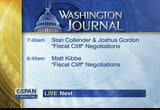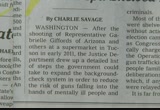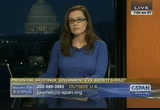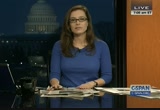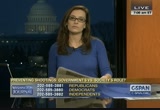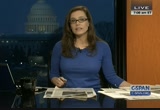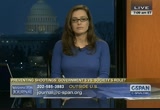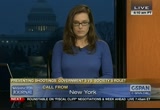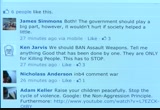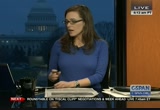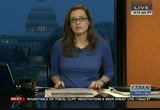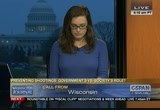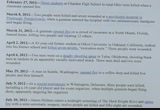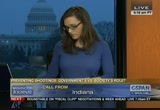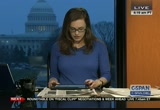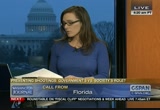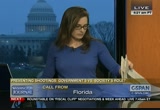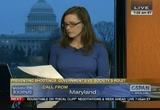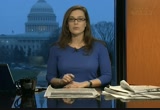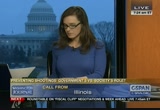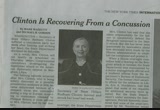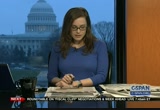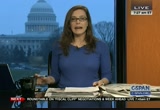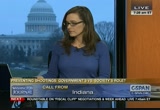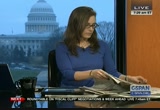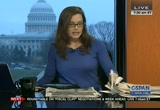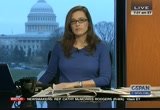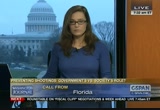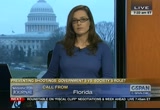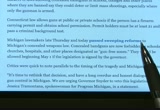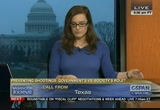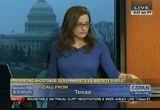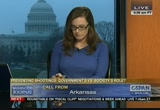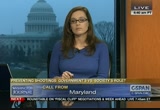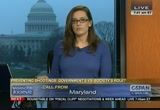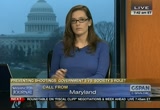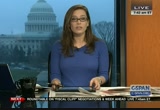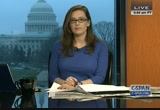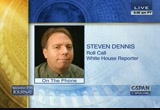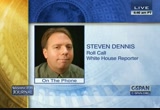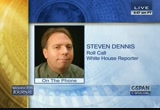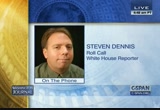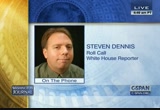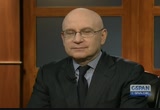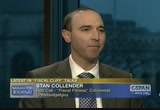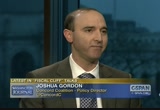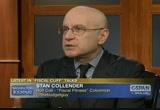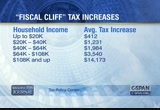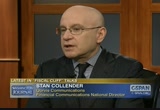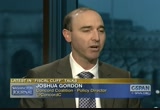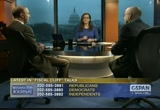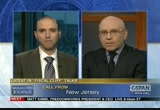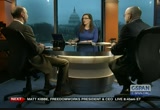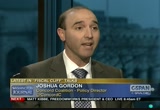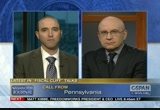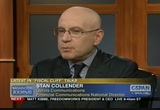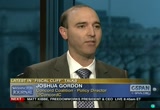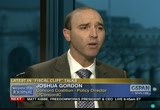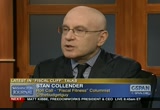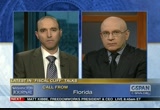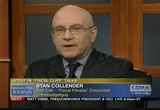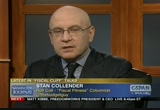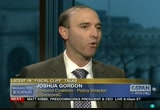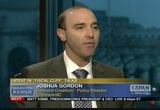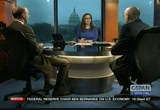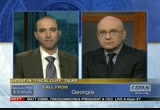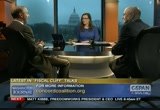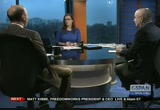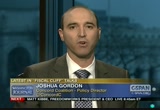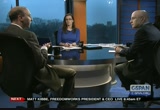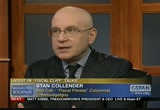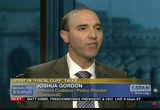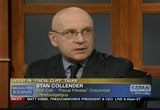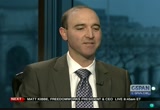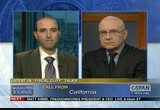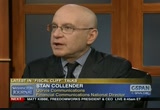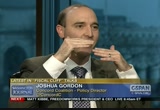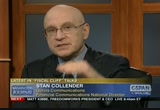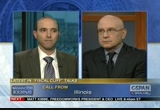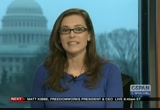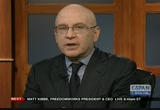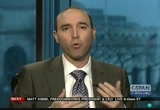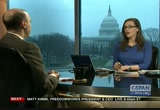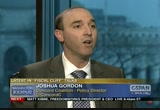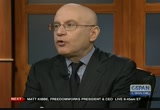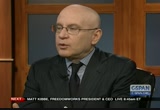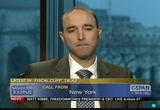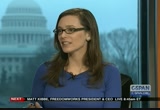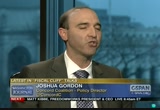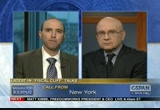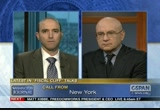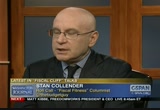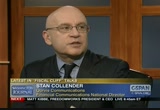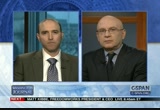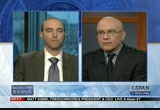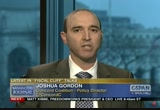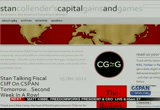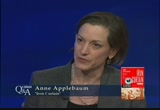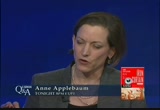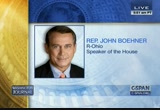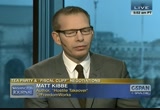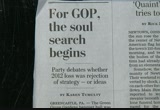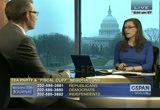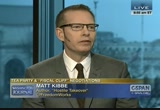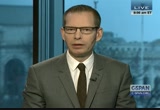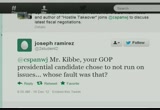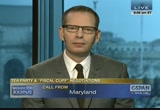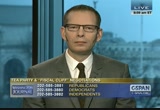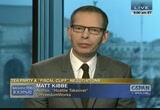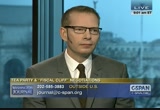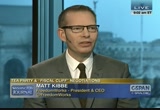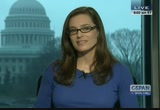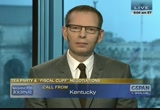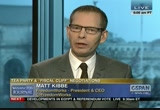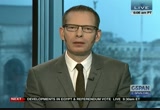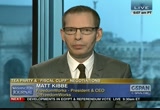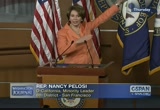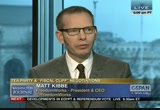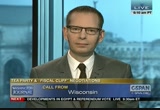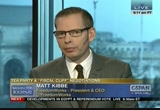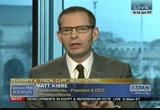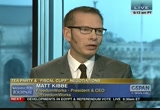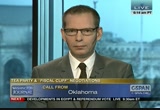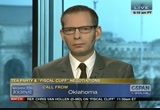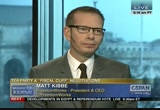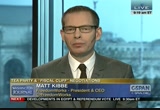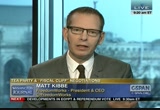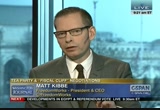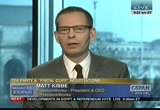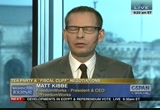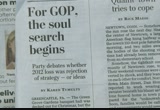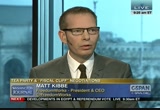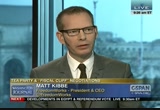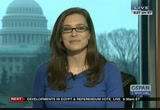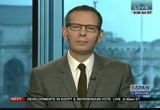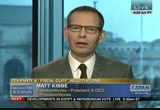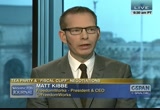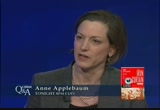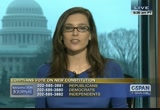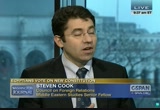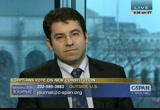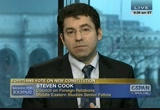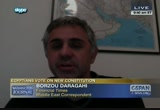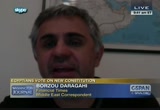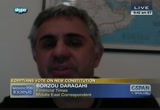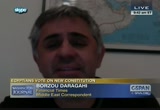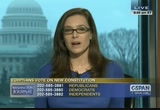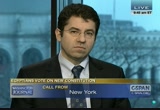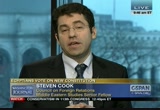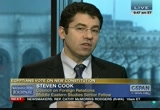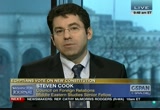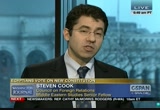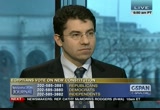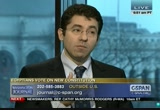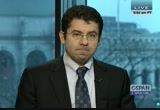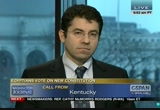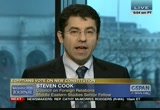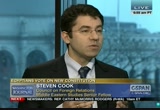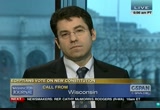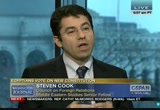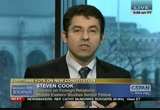tv Washington Journal CSPAN December 16, 2012 7:00am-10:00am EST
7:00 am
and the organization's fundraising and goals going forward. and later, steven cook on the council's foreign relations and what's next for president morrissey. washington redskins -- ♪ host: is this sunday, december 16, 2012. the flag over the u.s. capitol, over the white house, and in many locations across the country are at half staff today because of friday's school shooting in newtown, conn.. the nation's newspapers are full of details about what happened on friday. we would like to hear from you your opinions on how america can prevent mass shootings. is it the role of government or society to stop them? here are the numbers to call.
7:01 am
for republicans, 202-585-3881. for democrats, 202-585-3880. for independents, 202-585-3882. you can also find us online. send us a tweet, twitter.com/c- spanwj. or join the conversation on facebook by looking for c-span and weighing in. you can also e mail us, journal@c-span.org. here is the first page -- front page of "the hartford current" this morning. "day of grieving." the top headline, along with a list of the victims. the employees, all women. the children, all around the age of 67. this is "the sunday bulletin." "residents gather to find comfort and pray."
7:02 am
national newspapers also digging into this story. "the new york times" says that the people were all shot multiple times with semi- automatic weapons. white print on a black background. stories including one detail of what happened, acts of heroism, and how teachers behalf helped -- teachers helped their students to the crisis. this story at the bottom, "the justice department shelved ideas for improve begun background checks."
7:03 am
7:04 am
host: let's go to the phones and hear from our first caller this morning. greg? caller: good morning, how are you? they talk about needing to have background checks and all of this stuff, but that is not the problem. what it is, i will tell you. they say background checks? it is not background checks, it is your personality, your temperament.
7:05 am
i do not carry a weapon if your personality is short. i do not carry a weapon because i know i have a short fuse. i could buy as many weapons as i want. i do not have a criminal record. that background check stuff, they need to come up with something different. that is just an excuse. that is bull. they need to come up with a real thing. it is your mentality. i am 51 years old now. i know that i have a short fuse. they need to come up with a short fuse thing. host: how would you do that? how would you test that for people? caller: i do not know. that is up to the lawmakers and stuff. a background check, i would pass
7:06 am
any background check, i have no criminal record. host: should the friends or family weigh in on that? should they have a say on who gets a gun? caller cut that is so funny about this whole thing, these people are supposed to be from a nice town. why do you need all of those weapons? host: john, good morning. caller: good morning. the whole problem is being misdirected that the guns. everyone of these people in these mass shootings has been under psychiatric treatment. the whole pharmaceutical industry. they have 50% of the kids in school taking prozac. they are creating these
7:07 am
monsters. host: who is creating those problems? my grand -- caller tell my grandson's schoolmate jump off the 205 and caused a big traffic jam. he was taking psychiatric drugs prescribed by the school system. host: prescribed by a doctor? caller cut a prescribed prozac and ritalin. they should redirect where the problem is coming from. host: here is a different opinion on twitter.
7:08 am
7:09 am
society or government? caller: it is the role of everyone in the united states. i am getting rid of my guns. my husband was a police officer. i am getting rid of all of his guns. i do not have the need for them and i do not think that it worked out for -- worked out well for her either. host: that is your personal choice. do you think that the government should follow up on that? should society do what you're doing? caller: it is up to every individual. how has this affected all of us? i think we should all work together to try our best to prevent this from happening ever again. personally, my choice is to get rid of all of the handguns and all of the weapons that were my
7:10 am
husband's. the guns are not needed. it is my role, it is your role, it is the role of the government. host: democratic line, manhattan. good morning. cecil, what do you think? caller: all of the people that were harassing teachers about the price of what they charge their states for the work that they do, who would want to be a teacher in a situation like this? all of those people saying that the teachers overcharged us and that the unions break the bank of the state? they should think about what a teacher has to go through. the kid's mother, the news lately was saying that she was
7:11 am
some kind of survivalist, thinking the economist -- that the economy would crash. she has a mentally disturbed son with guns in the house? what she thinking about? she obviously has a problem along with her son. someone should have come to earth, saying that we know where you are thinking about. look at the results. host: you live in new york city. what you think about mayor bloomberg and his opinion on the gun issue? caller code generally what mort zuckerman was talking about -- caller code generally put more zuckerman was talking about, how many times has he been caught at -- stopped and frisked on the street on his way to an
7:12 am
important meeting? now they want to go through his pockets? he thinks that stop and frisk is ok? i will take my chances with the people in my community rather than a police organization pulling me over and the time they feel like it. host of this, and comes to us from facebook. a few of our viewers and listeners are listening -- to hang in. host: our next caller is an independent in the vienna.
7:13 am
caller: my comment, and it is not probably going to be popular, but my stance is that ever since the schools became drug free, more drugs than ever have been handed out to kids. the principal and the nurse in the school, whether it is packs all, ritalin, whatever. find a school shooting that did not have something to do with a kid raised on these drugs. you cannot find them. i promise you, whenever it comes down to, you will find out this kid was as well. host: but we do not know a thing about that, do we? caller: we do not. host: t think the medication is causing the problem or that it is being given to the young
7:14 am
people because they have a problem? host: whenever you do not allow the child to be active and vibrant and what they are and you try to change them into a bunch of zombies, eventually of what happens is that it works opposite from any other amphetamine of a kid, when they're little. that is why you can give a child coffee and they will go to sleep. suddenly they hit 12 years old and it starts working like the name. host: this comment is from twitter -- host: cheryl, democratic line, good morning. caller: how are you this morning? host: what is your solution?
7:15 am
caller: is certainly sad, the state of affairs when it comes to mental illness. i am a former psychiatric -- former psychiatric nurse. i saw ronald reagan close all the hospitals in california. and the mental institutions. there is just not enough done for the mentally ill for us to determine what course of action to take. it is very sad. host: would you do to improve this situation? more government funding for facilities? more outpatient help? caller tell all of the above. it is so important, there are so many people whose lives are fragmented by mental illness. it is a very sad situation,
7:16 am
having worked in the field for many, many years. it should be obvious, to be kinder to people, for one thing. to be able to identify people who are at risk of becoming ill. host: do you see resources for families? is there a good place to go to get help? caller: certainly to their physicians, but oftentimes that is not enough. people cannot -- people can be almost frightened by the prospect of anyone in their family or in society being truly l and frustrated.
7:17 am
host: this piece chronicles the shootings that happened in 2012, lead to -- leaving at least 88 dead. the tragedy in connecticut is described as indescribable. 16 of the mass shootings this year, including one in georgia at a korean health spa back in february. it goes through other incidents. jackson, tenn., at a nightclub. a high school in rural ohio. a psychiatric hospital in pittsburgh, pennsylvania. it goes on from there. we are talking about preventing shootings. is there a role for the government or society? what do you think? republican line, silver lake. caller, hello, c-span.
7:18 am
-- caller: hello, c-span. it has to do with a lot of things. it sounds like this man at 20, he did not have a strong father figure in his life, which should have. there is so much of that going on in this country today. host: what does that mean for you, paul? caller: i have three boys. i have taken my son's hunting and we have been shooting firearms since they were seven. they have never regretted it or had any trouble. they are raised operate. i have a strong connection with my children. i hope that they do with their
7:19 am
children as well. you have got an incident down there that happened -- this happens on the streets of chicago every week. we are being blamed for it by having uncontrollable gun laws. they say that this lady was a survivalist. this is true, but we have an active dictator in office. host: where did you read that she was a survivalist? what does that mean to you? caller: i am afraid that this country is headed down the road to communism. host: i am trying to find out where you read that she was a survivalist. what does that mean to you? where did you find that? caller: i have every suspicion that he is going to pull
7:20 am
something in this country that will shake the country to the court. host: ok, well here is an msnbc story touching on something our last caller talked about. they have that report on msnbc. here is how the father of the gun man responded. cory, welcome. what is your take on this? caller: even from when i was
7:21 am
going -- growing upper, a lot of young kids are being put on all types of medications and stuff. how they might find later that a lot of these people who are doing things like this are on drugs. some kind of drugs. because guns do not kill people. people kill people. that is the bottom line. weapons are for a reason. maybe there is an over abundance of them. i think that more people are on drugs than ever before in society today. people were out having a good time with regular things that happened in the world. host: here is a comment from twitter.
7:22 am
7:23 am
i am quite sure that the four fathers of this country were not thinking about weapons like that when they decided upon the second amendment. another thing, they have so much violence in the digital games. all this violence has been exposed to children at this what you -- young age. host: this is from twitter -- host: you can join the twitter conversation by going to twitter.com/c-spanwj. from "the washington post," this
7:24 am
could be a tipping point for gun control advocates. they believe that the massacre there will do what so many other recent mass killings have failed to do, force president obama and congress to take action. obama came under increased pressure this week and from members of his own party to call for stricter limits on gun buyers. republican line, illinois. kyl, good morning. caller: i have an incredible issue with what has been going on with this. it has been so sick. i cannot believe how milk your tits look. host: we will be talking more
7:25 am
about the fiscal cliff later on this morning. there will be two guests in a round table giving us their sense of whether a deal can be reached. all of this before the year turns over. this is from "politico." host: looking at some other news, secretary of state hillary can -- hillary clinton recovering from a concussion. she will not be testifying as a result, testifying before a congressional committee about the september attack on the
7:26 am
american diplomatic outpost in libya. it is being widely discussed as she was a possible presidential candidate for 2016. but this is according to a statement released by one of her advisers. "the new york times" looks at medicare and issues around it that could crop up in the future. saying that it is the single biggest contributor to long-term deficits, "no americans other than possibly the very affluent pay enough in medicare taxes and premiums to cover its potential costs." part of the new series on the debt that "the new york times" is doing. there are some leaders of connector kit that will be seen on sunday talk shows, -- leaders of connecticut that will be seen on the sunday talk shows.
7:27 am
they will be seen on "this week." the governor will be also on "face the nation." we will learn more about that. right now we are talking more about preventing these mass shootings. how can society help? whose role is it to stop them? mike? the right ahead. -- go right ahead. caller: i would like to bring up the kids and the violent video games again. these are not the real consequences of taking out these guns. it just becomes part of the culture. host: mike, what would you do? would you ban them? make them available only to people of a certain age? caller: the age limit would be
7:28 am
fine. maybe get that to go outside and play. host: so, the roles for parents in society? caller: yes, ma'am. that is a real legitimate thing to look at, i think. host: this is a written in -- host: steve is an independent caller in indianapolis. good morning, steve. caller: my comment is that in israel they have an-16's at the school's." and the solution should be, i believe, that we need to actually gunned down these
7:29 am
terrorists. we have done a free school zones 1,000 feet from most communities. we spend billions at the airport for security and around the world we have tried to police the world. we cannot put officers in the schools or allow teachers to carry guns in most districts. there is one district in texas that allows teachers to be armed. but i think we need to stop providing these people to our schools. we need to start putting these terrorists in body bags. host: you would like to see more liberal policies in terms of carrying guns into places like schools? caller: absolutely. the gunmen would never go to a police station. the gunmen would never go to an airport if he knew that he would be confronted with stiff
7:30 am
resistance. the department of justice did a study, their number one fear is approaching an armed victim. that is their number-one fear for prisoners. instead of demonizing dealing with the guns, we need to protect our women and children, protect our communities by designating -- this is a gun free school zone? you are inviting terrorists and everyone who is deranged to come into your school to do whatever they want. they know that women do not like guns and take guns. that is my comment. we need to stop acting like gun free schools will fix this. host: in terms of women not liking guns, in the news this morning we saw that the mother of the shooter was the owner of the guns and is being called a gun enthusiast. so? that might dispel your idea that
7:31 am
women are not people who use guns. mark, miami, florida. caller: good morning. your first name? host: al-libi. caller: -- libby. caller: commenting on that last part, i think it is interesting and unfortunate that a woman would be in a state like connecticut, a pretty economically sound stage, like the south side chicago or east st. louis. that she was driven to be in possession of these weapons. her husband was apparently an accountant and work for a large corporation. as americans we all have the prerogative to own weapons. my observation is that maybe the sun, from an unfortunate psychological standpoint, was
7:32 am
trying to make the comment on the fact that his mother was the gun toting person in the household. my personal observation is that out of all of these last shootings, going to the 60's and 70's, the worst we ever heard was someone being in a fistfight. i do not know how we transitioned into this super violence. the observation that i would make, they resort immediately to weapons rather than fists. i think it is kind of a -- it is a way to avoid patent, physically and psychologically. i also think it is symbolic of what our government does. we drop bombs on people.
7:33 am
there could also be a connection to that. i think it is unfortunate. i would close with this -- we claim to be free people living in the united states, but if we were to show, and i would care not to look at it myself, the children that were killed, or the marines killed in fallujah, i think it would be alarming to all people, 30 years old, 50 years old, 60 or 20. i do not want children to see it. but i think it would put an end to all of this violence. 300 million guns in the country in a population of 300 million citizens. as a solution for the right wingers, i appreciate your composure.
7:34 am
as a civilized male raise my civilized women, i am quick to remit that i will vote for hillary when she -- i'm quick to admit that i will vote for hillary when she runs for president. the female indian chiefs, as has , led a mored civilized world prior to the caucasians coming here. let's give women a chance. i appreciate his mother having the option to on weapons. i would question her desire to have them. it is her prerogative. i do not know. host: we will leave it there, marc. pamela, twitter.
7:35 am
7:36 am
host: texas, san antonio, good morning. caller: my spin on the guns is that we have got to get rid of the 2, 2, 3, and the high- powered rifles. i know that i spent 27 years there and i know the difference. the speed that the bullet hits your shoulder, they would just be wounded. these band-16's, you could hit them in the hand. the speed of the bullet just explodes.
7:37 am
i would estimate that even if the guy was using the old semi- automatic, people would be killed. i know it is not much, but if we could just get away with the assault rifles, it would hold down the massacres, like what happened in the school. only half would have been killed. from my knowledge of weapons over 27 years, it is different. you hear that a person is 45 with a bullet, it is so slow it will not even penetrate you or knock you down.
7:38 am
it gets to the person behind you. that is what i would like to see. i know that we will never do away with guns in america, but we can do away with assault weapons. i have seen people shot in the shoulder that have died within seconds. host: here is a look at a piece from "the new york times" this morning. host: that is one opinion. here is what mary says on twitter. host: jeremy, independent.
7:39 am
cheryl, arkansas. caller: good morning. i wanted to pretty much second the old boy from florida, mark. he said everything i was thinking. i watched a really good documentary on this last night. it was called "murder by proxy." pretty much what it is is our society and how we treat each other, say the government's, it is horrible, how can we talk like that? host: what would you do to fix it? caller: i do not know. i have not got a clue. i can see what it is. i see it in churches. even whenever i go to church down there, like being in the political season, it was not
7:40 am
what church was when i was a kid. host: dennis, democratic caller, maryland. caller: first of all, thank you for the opportunity to get in on this. i will date myself as far as age. back in 1968, when washington, d.c. exploded with riots and whenever, the first sent in the national guard, who could not handle it. president johnson called in the second airborne. the story is that he put a trooper at every door in the schools. one trooper for the whole school. i went to eastern high school, it was a very large school. i walked out that day and the trooper was standing there in full combat gear. flak jacket, gloves, the whole works. he had a fixed bayonet. there was no trouble in the
7:41 am
whole school because of that one airborne. now, the fire is already raging out here. we are awash in guns. my solution to the problem, i am nervous, but my solution to the problem is that we are going to have to arm neighborhood militias. we have to protect the most innocent of the innocent. you do not get in there and start talking about gun control on capitol hill, they will not do anything. we need to arm the neighborhood citizens who are capable of handling these automatic weapons. let the criminal element and mental element know that if they walk into a school, a 50% of a chance they might not walk out
7:42 am
with their lives and it will not be from suicide. the israelis have it right. they know that they have a constant threat. we have a constant threat in this country. from nuts in these guns. we have to order and stop it first, then we talk about how to keep our kids and public say. but the bottom line is we have to come up with a citizen militia. the president should do that to the justice department by deputizing certain people in the neighborhood and the schools. it cannot be just one security guard. he could be clock. he could be watched by the terrorist. the terrorist who is doing this. you have to have more than one, females are ready to go down with dedicated citizens in these great neighborhoods who are
7:43 am
armed and ready. they just need to be called upon. host: let's look at some other stories in the news. this is from "the hill." there are reports that john kerry will be nominated for secretary of state. host: we are seeing other news outlets reporting the same thing. "abc news, saying that john " kerry is to be nominated." that is the headline on some of the leading news sources this morning. we are also watching what is happening with the so-called fiscal cliff. this is the headline from roll- call. "speaker boehner offer -- said
7:44 am
to offer millionaire tax increase." dennis, dig into this headline we are reading. what is new about what is on the table. caller: it would appear that boehner is giving in to the political reality that we are a couple of weeks away from these tax rates going up anyways. he is trying to outmaneuver the president by having these only affect the million dollars and above, a position that a lot of senators and house democrats as recently as six months ago were pushing as a concession. so, that sort of gives the speaker and republicans a talking point where they can say -- even nancy pelosi of some point was ok with only raising the rates on people making more
7:45 am
than $1 million. now, doing that raises about $400 billion. you would have to do other things to get to the $1 trillion that the president is demanding. it is definitely a sign of progress. although there are a whole bunch of other things that the white house wants as well, including the debt ceiling agreements of the level of cuts, which have not been reached. this was one of the key questions. the white house for weeks has been saying that this deal could be worked out within one week if republicans would only agree that tax rates would go up on the wealthy. now here we are in some limited fashion, the speaker is agreeing to that. host: we are talking about john boehner, but he is not in washington right now.
7:46 am
he is in ohio. who is doing is negotiating? how are the channels open? caller, obviously you have these phone calls the take place. you have top aides on all sides. the president has brought neighbors, who has a voice on capitol hill. a longtime aide for the president. he has been the deputy in the budget slot and has helped to negotiate these deals over the last few years, averting a series of government shutdowns with handshakes in the capital. dealing with the debt ceiling drama of last year. you also have the president's chief of staff, also a budget director and running strategy for the white house. asked timothy geithner, the outgoing treasury secretary, the nominating head negotiator. and then on the side of the speaker you have what is
7:47 am
basically a more broad group of folks who are helping him to negotiate. they brought in folks helping with those committees, as well as people like his policy chief as well. host: what are you going to be watching as we head into the week as congress returns from the weekend? what should we look for? caller: we will see a lot of back-and-forth on this idea of mr. president, now that we have given and on this key demand, why can we not -- why can you not give in on entitlements? this has been a key demand from congressional republicans since they -- since the election. where are the president's
7:48 am
entitlement cuts? they want to see things that are concrete, that they can sell to their conservative base. things by raising the age of medicare. things like shrinking the inflation rate for our social security payments. there are all of these kinds of specific things that they want. they have not seen the president do this. in the grand bargain talks, the president did sign onto a lot of these tougher measures. and now a lot of these allies in congress are digging in their heels against them. are there other ways to raise the $100 billion or so in the medicare issues over the next 10 years? yes, but they may not have the same trophy aspect like a lot of the republicans who really want something concrete that they can
7:49 am
explain to people. where this is a real tough 5 thing that we could get. host: briefly, we're seeing that senator kerrey may be tapped to be secretary of state. what have you heard? caller: that is the consensus on capitol hill. that senator kerrey would fly through the senate. the republicans have been touting him as someone who would be better than susan rice and easily confirmed. they are not unhappy with the fact that it would create a special law election in massachusetts. they would like to see scott brown when that special election and come right back. i think you are going to see a lot of -- i think you are going to see a lot of pull for john kerry in congress. then the dominoes start to fall.
7:50 am
what about that massachusetts seat and members of congress running? people with the ability to raise a lot of money, with a lot of name recognition in that state? the kennedys, who also lived in massachusetts? it will be very interesting to see those political documents falling after his name. host: stephen, thank you so much. we have been talking this morning about the shooting on friday in connecticut. president obama will be headed to new town this evening. he will be attending a memorial service and he will speak at an interfaith vigil for the families and the victims. he will be meeting with the families and he will be thanking the first responders. all of that this evening on c- span. we will be right here. something else that we are doing right now this holiday season is
7:51 am
looking at the chaplains who work in the building behind us in the u.s. capitol. you can find more information about this on our facebook page. you will be able to see who these people are, their biographies, and you will be able to learn more information about them. coming up next, we will be learning more about the so- called fiscal cliff. later on, the president of dreamworks will talk to us about the future of the tree -- the tea party. >> coming up later, we will vieira network tv talk shows on c-span radio. the focus on all of those shows is the shooting in connecticut. a "meet the press" beginning at noon. at 1:00, you can hear abc's "
7:52 am
this week." with an appearance by the connecticut governor, richard blum and fall, and a republican from utah. at 2:00 p.m., "fox news sunday." dick durbin, joe lieberman, and [indiscernible] "state of the union" follows that at 3:00. including richard blumenthal and chris murphy. at 4:00, "face the nation." bob schieffer talks with governor molloy and paul vance. chuck schumer of new york and kay bailey, from texas. these are brought to you as a public service by the networks and c-span. the rearing begins at noon
7:53 am
eastern. at 3:00, listened to them all on c-span radio. -- listen to them all on c-span radio. you can listen on your smart phone or online. caller: my inspiration was -- [video clip] >> my inspiration was the archives and documents about the cold war. talking about roosevelt, stalin, churchill, we know the main events from our point of view. i wanted to show it from a different angle, from the ground up, what did it feel like to be one of the people subjected to this system.
7:54 am
how did people make choices in that system? how did they react? how did they behave? one of the things that has happened since 1989 is the region called eastern europe has become very differentiated. these countries will longer have anything in common with each other except for the common memory of communist occupation. >> more with anne applebaum, tonight at 8:00 on a "q&a." >> "washington journal" continues. host: for the latest in the so- called fiscal cliff negotiations, we are joined by stand from -- stanley collender, and we also have josh gordon. thanks to you as well. stan, you were on last week and
7:55 am
we ask you for the percentages. you put the chance of a fiscal cliff getting done at. this week? -- gettguest: i think there is o chance other than new year's day, and even that might be overstating it a little bit. right now i am seeing a 75% chance that they will go over the cliff. host: joshua, what odds would you give? caller: i have no idea. i would say that it could be 50 -- guest: i have no idea. i would say. the thing that americans and the public should worry about is whether they get something done soon. there is a chance that by inauguration day, something will
7:56 am
be done. if something is done in the first few weeks of january that is a broad deal, whenever it was done, that will not matter. host: why is there that buffer for you? guest: because the main things that we worry about with the fiscal cliff, sequestration and tax increases, those things can go for a week or two without really impacting the paychecks of americans, tax withholding tables. your average american is not going to feel some kind of knee- jerk drama in the first couple of weeks of january just because we went over the cliff for a day or two. markets might react strongly, but your average american does not depend on the daily generations of the dow jones. host: let's take a look at the details of these fiscal cliff tax increases.
7:57 am
"the bush era tax cuts expiring to the tune of $220 billion." there are other provisions expiring as well. and there are new affordable care at taxes scheduled to kick in. do you feel that there is some lag time there? that on january 1 or second, that is not a crisis moment? caller code josh is exactly right. it is more of a fiscal slope. the fiscal slick -- guest: joshes exactly right. it is more of a fiscal slope. it is the ability of people to spend money because more will be people -- more will be taken out of their paycheck, that is relatively small. taxes going up, that would not all be withheld from your paycheck. the real damage of the fiscal cliff is if it stays in place over the whole year. that is when you get the economy back into a recession.
7:58 am
politicians know this. that is why there is not much of a demand to get this done by january. plus, if they really wanted to, they could enact something very short term to coast on the impact. host: if you would like to join the conversation, here are the numbers to call. for republicans, 202-585-3881. for democrats, 202-585-3880. for independents, 202-585-3882. host: let's look at the numbers of how taxes would change for americans. an average tax increase of about $400. you can see it on the screen, how it goes up.
7:59 am
host: we are seen news, and we just heard from stephen and dennis, the speaker boehner is putting some numbers on the table in terms of taxes he would be willing to let expire. host: i have the physical fitness column at roll-call and it is always good to hear from him. he put on the table yesterday a plan that would increase taxes on those earning over $1 million. the speaker is putting as a condition of that tax increase, less of what the president wants, the republicans will redo the changes in the debt ceiling so that we do not have to go through the. my understanding is that it is not adequate or enough. discussions are continuing and not much has changed. host: at what point does the market start to react?
8:00 am
guest: how much of it is supposition and that the politicians could never get things right but it's hard to say that the markets are going to react because i think the -- think what's really going to be the deal and volatility isn't that bad right now on the stock market. so i think they think there's going to be a deal and i think you know, there's an intuition that there's going to be a deal. no politician is going to self-impose a recession on the country because they can't get their act together over a three-month period. guest: let me agree and disagree with josh just a moment. josh is right. there's still a general attitude oh, there's no way they would let this happen but there's been
8:01 am
a growing admission that we might not get a deal through january 1 and it might not be that bad a deal. this is not a thelma and louise going over a cliff kind of situation but this is a big week for wall street. i suspect a lot of opinions are going to changing? they don't get something together. but how negatively will the market react and a lot of folks in washington are hoping for a big negative reaction only so that can change the politicses a little bit. host: let's go to the phones. a democratic caller in trenton, new jersey. welcome, keith. host: -- caller: hello. how are you today? host: good. caller: the comment is about people who need these moneys or these tax breaks, they're the smaller people who makes everything run in this country.
8:02 am
when we change about the contribution, corporation fill money to senators to do their bidding. they're being voted in by the people but they're doing the bidding of the corporations and so they say go to the -- the politics needs to be voted out. remember those people who voted and played with their money. so when you have all those chain donaters with no -- chan campaign donaters with no chance of saying the money's there. you do what we say and we fill your pockets.
8:03 am
host: do you take that as a mandate? the president should be able to get his way on the fiscal cliff? caller: it's the people's way that they voted. it's the point is that these politicians who have no caring about that. they want to keep stay in their offices and do what they want because they're very egotistical. you have to look at the age of them. 60-65. they're not trying to change and give up their moneys. they're listening to their pockets and the corporates of the people who are putting money in their pocket. host: so keith expressing some frustration and anger in the congress. he talked about the will of the people. how much does the recent election play in the power of the negotiation? guest: only that because you
8:04 am
have the president re-elected he was in this strong position of his ideal fiscal policy coming into law without congress having to take any reaction. so it will expire whether or not congress and the president get a deal and i think that strengthens his hand in the negotiation. and then, you know, the rest of the election i think, tests the health republican and kept the senate democrat and i think, you know, so from a game series perspective -- gain series perspective, the election strengthens the hand about how the laws are written. and ultimately about making the people's decision, the interesting thing about the fiscal cliff is it really is a decision about the people because otherwise, if this was about real concern for deficit reduction over the long term and the deficit being the only thing that the politicians care a they
8:05 am
would probably let us cover the cliff because it's a huge amount of debt and reduction but they don't want to do that because it will harm your average american. it would harm spend being programs, including the budget which we can debate whether or not that's our main defense contractors or not. but most of this austerity is a problem because it really hits mean street america and could put us in a recession which could harm unemployment. host: let's go to ed in pennsylvania. good morning. caller: yeah, good morning. i want to say something about this so-called balance approach that he's talking about. this $16 trillion we're in debt, how did we get here? ronald reagan gave these passive tax cuts to the wealthy that are still in effect today. the bush tax cuts on top of those. they reduced the federal state
8:06 am
taxes into the wealthy. more money going into in the treasury. when you don't have enough money to pay your bills, you borrow. so the rich have been the beneficiary of this $16 trillion in debt but yet, they want spending cuts four to one taxes on the rim. it should be just the opposite. the rich had, if they had been paying their taxes all the years, we won't even have this debt. host: ok. let's gl go to sam. guest: let's keep in mind that ronald reagan also signed five tax increases over the years. it's not just that he cut taxes, he did but there were also tax increases along the way. but what the caller us a as has identified is one of the big focal points. it's a lot of the pressure's going to be on medicare and medicaid and st.
8:07 am
those programs benefit middle to lower middle class folks. there's clearly going to be this kind of fight going on and it's not just going to be done between now and the end of the year. this is what the debate's going to be on for the next decade. host: we're seeing stories from this one like steven dennis. how important this debate over the debt olympic? how does it factor -- limit? and how does it factor in? guest: if republicans don't agree it now, they'll get a stronger hand and then you have the president on the other side not really just concerned about this debt ceiling debate that they'll have in a month or two but in really concerned about all future debt ceiling debates. the idea that you're going have continually political control
8:08 am
one house of congress hold up ceiling passage for certain policies. and i think the president's policy to try and diffuse that debt ceiling bomb going forward is a good one if it's paired with a budget process reform that will allow congress to feel like they continually weigh in on these big issues of spending and taxes. right now through the budget process, it's been pretty difficult for congress to have votes that they can show their sandwiches on these kind of big debt issues so if you're going to replace in the debt ceiling, replace it with something that will give them an opportunity to vocalize their concern. host: how much does this become the point of leverage? guest: i think the republicans
8:09 am
are overstating what they think the leverage was going to be. it was finally an agreement to increase the debt ceiling that resulted and intact much of the fiscal cliffing. it created anything but the super committee and that triggered the sequester cuts if we don't get another agreement but the politics show while both the white house and congress got hurt by that, the republicans and coco got hurt the most. it's a pattern that republicans will start to get tagged and politics don't favor them as much as they think. they're also, looks like the white house maybe getting closer to a congressional democrat to other ways of getting around the
8:10 am
debt issue. and we're one of the few countries that requires a celebrate vote on their own ceiling and it makes no sense whatsoever. host: tom is our next caller from plantation, florida. good morning, tom. caller: thank you. thank you for having here. you know, this whole process to me is pretty ridiculous. what would the democratic party be without the republican party to blame? you know, i would like each member of the panel and anybody calling in to explain to me how $80 billion is going to have any meaningful effect on $1,200 in deficit. would you please explain that to me? this whole thing is about the democratic party wanting to blame the republican party for reforms they know they're going to have to do to have any
8:11 am
meaningful effect on this deficit. and everybody knows it. everybody did. understands economics knows that. i'm in the cavern today. the republicans voting president on anything that the president wants, if he wants it, he owns it. and if it's the right decision, he gets the credit. but if it's the wrong decision, he also gets the credited. i think that's the last thing that president obama wants. he needs a republican party to blame for the things that we need to do to get this country in the right direction. >> guest: both parties blame each other all the time. the fact that the president is blaming the republican, we need to do that is surprising since the republican has been dealing
8:12 am
with the president in other administrations as well. i'm trying to figure out a polite way to respond to this. seems to me you get elected to vote for things. and that way, it's not just the president going on the record and taking responsibility, it would be both sides. i would urge this for the dem as well. that's a chicken way of doing it and trying to fight your way against your constituents. keep in mind at the major goal of the fiscal cliff is to avoid the scarf cliff. that's the whole idea that it would reduce the deficit too far, tooth until the kids can't handle it. so we're talking reduction of the deficit rather than increasing or or a big grand bipartisan. host: dan colander for corbett
8:13 am
canuckses. he also has a blog called capital gains. the other is the editor of conquer the blog, the tabulation. i'm going to let my mouth rest for a second and throw a question for you. the cliff may cause in the short-term pain and so let's jump. what do you think about jumping off the cliff? caller: well, jumping off the cliff is an interesting thing. they say that in the first quarter or first two quarters of 2013, we would be back in a recession but they project growth to pick up after that and the interesting thing is by 2022 which this last of the 10 years
8:14 am
that they project forward, they have the economy growing more quickly than if we didn't jump off the cliff because of that distinction reduction. there is something to be said that large deficit reductions do improve economic growth over the longer term. but i think after the experience we just had and how up employment is still abnormally high and it makes sense because the politicians can't do that and impose more deficit reduction in the future and there's no reason why you wouldn't make that trade-off. in fact, you can do a little bit more deficit increasing over the short term to stimulate the economy to mike sure it's on the right track. and impose more deficit reduction down the road to counterbalance that. and that's the right way to think about things. wow you look at what can you do for the short term and what can
8:15 am
you do for the long term? host: it's really a movement afoot to see that happen. >> it's very significant. con coward is the leading facility hawks in the country. and josh, you know, he's one of the leaders of the organization and just explained it extremely well which is there are different ways of helping the deficit. and so that's very, very significant in terms of the overall debate. i would say the same thing to diddy. there's no reason to do that. even a better result if we do this in a more thoughtful way rather than jumping off a cliff. host: is it a sign of political frustration when you hear comments like that or receive other feedback like that? is there a growing movement of people in america who says forget about it, let's see what happens? >> yeah, there -- they are the
8:16 am
most repeated phrase recently. yeah, there are some frustration and other folks who say i'm tired of this debate and move on. i've got a column taking out on roll call. one of the thing i'm going to bridget is the deficit is going to get better next year and any different talks are likely to increase in tax increases. so i think all of that is going to reduce some of the tension a little bit. host: next caller is from atlanta, georgia. good morning. caller: good morning. no matter what happens with the fiscal cliff, i have a feeling that the politicians are so far apart they're not going to do anything with a bigger problem of what i like to call the fiscal abyss. if you care about the programs
8:17 am
like i do, like stft and medicare, the decisives are for these programs. the fiscal abyss is the bigger deal and also, i've been part of the con coward coalition since about the beginning and worked for the concord coalition is so important. and i have republican friends who are members. democratic friends. how can we contribute it and the best way to go on the website? guest: yeah, our website offers a lot of different ways to donate. host: it's not a planting call, right? let's just tell our audience about the coalition briefly. >> sure. the concord coalition was started in 1992.
8:18 am
it was started by two former star ins and we just lost senator rug-man in the last couple of weeks and he will certainly be missed. but if you could two leaders from the parties, have this kind of grassroot -- to educate constituents. if you educate outside of the beltway for the long-term challenges and decisions that had to be made. you're here in washington, it's all about the short term. so if you educate out there about these long term issues, maybe the politicians will be able to talk about the harder choices down the road. host: let's talk about matthew's fiscal abyss, where he's log at in the future. >> sure. guest: so one of the things holding up this fiscal part is what i consider honest debate over how to transform programs
8:19 am
like medicare and st. for the long term. and what kind of cuts do you need to make them sustainable over the long term? and what kind of tax increases do we want if we don't want to cut medicare and social security too much over the long term? and the reaction is a health cost bit. how do change for these programs compare need aging of the population is going to have babybooms receiving the benefits and leaving the workforce where less people will be able to pay taxes. and balancing those things out over the long term, it is much more significant for people who are concerned about the deficit and offset some of the deficit reductions over the short term. >> done you think one of the interesting here is these commitments we made in the
8:20 am
1930's in social security and 1960's in the medicaid didn't take into account a lot of the things that are happening so isn't a debate that can -- whether we can keep the commitments? i mean, it's not how do we explain that to people and what they were expecting or they were told to get other promises. can't be kept. guest: people understand pretty clearly when you have less children being born and less workers to retirees and there needs to be changes made for this demographic shift and that's really a 20-30-year problem. if you have more beneficiaries and less workers paying taxes, you have to figure that out. and i know that sounds pretty inseptic when you're talking about real cuts to these programs to make up for that but
8:21 am
it's something everyone's going to do because they want these programs here in the future. they want them here for their grandkids. if you started to reform this now, you can see the changes in a pretty long time. people trying to adjust taxs and it doesn't have to be any harm from the beneficiaries. guest: you use the word anti-septic. what i see in the polls are support. i don't know how you pull that off and that's the debate. host: scott asked whether you think social security should be part of this fiscal cliff topic? >> no, just ask social security
8:22 am
to it and kilt completely. social security is one of those things. i have argued with millionaires, mularkey millionaires demanding that they get their $2,000 when they retire. it is a debate that we're not ready to have. just haven't set program tergs about it. people are not prepared for it. and you will get a lot of debate folks and make the fiscal cliff impossible to do. >> i agree that. when you're talking about raising tax and the long term and short term budget, we need to look at the whole budget. in an ideal world, you wouldn't do that two weeks before you go but what we have to do, politicians and americans used to doing is thinking about these programs more fundamentally. what type of social insurance do we want. how do we want dead care to work and decide what we want from those programs and be willing to
8:23 am
pay for it. and i think there's this loss sense that decision made on the spending side are connected decisions made on the tax side and american have been sharing to be willing to suffer increased taxes if they know it's going to shore up social security or if it's going to make medicare be more efficient and more affordable. and i think having that connection ain'ts us to make those hard per choices because it's not seen in a vacuum where taxes are being raised so just so government can go waste money on $100 toilets and that kind of idea. >> i wish that were true and the people who come to the events think in that rational fashion. i see people who want all the benefits without having to pay for it. they want someone else to pay for it. you've said we haven't had the dead crated to that debate. we haven't gotten people no
8:24 am
understand. -- go understand. given the congress needs a fiscal cliff to move on something, it's hard to imagine that they move 25 years early. host: we're talking to our guests with father are dan with a column in -- with a column in roll call and john fisher, policy director. guest: can we give my twitter handle too? host: we've been showing it on screen. dan is the budgetguy and josh gordon, the con coward coalition. twitter handle is @concordc. charles is up next.
8:25 am
go ahead, cardinals. caller: hi. i just want to talk to you and talk to your viewers about the difference between $1 million and $1 trillion. i don't think people realize the difference. if you were to take $7 million. and let's say a trillion's second. a million second is about a half day's time. a trillion second is about a thousand years. i don't think people realize just how deep our debt is and talk about erasing tax on the rich. if he could carry billionaire in the world, it's about 1,200 billionaires in the world and if he took their combined wealth and pile it to our national debt, we would be nearly $12 million in debt. host: why are those numbers important to you? guest: because --
8:26 am
caller: because i don't believe american voters realize how much money that is. host: ok. caller: it's passed around so loosely in the news that people don't really grasp how much fches host: do we have a sense of proportion to our debt? guest: did he just call me mr. colander? it's almost meaningst to a person. it's something with a lot of zeros behind it. but what's important is looking at things on the g.d.p. that's from a far more economic terms in portland's statistic. and the percentage g.d.p. is up there but the deficit at $1 trillion showing how it's not as big as it seems. it's not as destabilizing as it seems economically. don't be scared by the absolute
8:27 am
number because it's relative to the size of the economy, relative to the numbers of americans. yes, the button's much bigger but the country's butch bigger and what we're doing is much bigger with our military. the absolute number is insignificant. host: yeah, i would just add that in a way, we don't need to understand the numbers. what we need to understand is that you have growth in some programs and were not raising the taxes to pay for that and it's really a simple equation, our national film director goes around with a grasp and the -- graph, and the graph is you have high government spending here and low government taxes here and if we want a high government spending, then we should pay for it. if we want low government taxes, you bring the reducing down. it's all simple. even i don't understand the numbers. i'm pretty bad at math.
8:28 am
but you don't need to be good at math or great at math to figure is in out. ultimately, it's about bouncing those out, make sure that our debt is not growing more quickly than our, economy -- than our economy. it's a basic equation like that. guest: charles is raising not a question about -- a question about balancing the budget. he wants the government to spend less. he didn't say what he would like the government to do less of. and increasebly, that's what i see in the polling. the polling seems to show americans don't want fancy governments, but a government to cost less. let's say the budget is $1 trillion and revenues are $800 billion. you want to balance the budget by raising revenues, that's a
8:29 am
balanced budget. balance doesn't need to be the important element there but the question is what are we willing and what do we want to government to do? there are a whole bunch of cabinets who may not be important now. host: we need to look at the whole military budget first. that's one opinion coming into our twitter feed. george in champaign,y. hi, george. caller: hi. yeah, i just wanted to say it's great what you guys are doing a the program about the fiscal cliff. it's hard as a voter knowing that the lawmakers are taking voters for granted, thinking that they don't care -- host: we'll move on to carolyn, a democrat in nebraska. next good morning, carolyn. caller: good morning and thank you for your time. i'd like to have some discussion
8:30 am
on a flat tax. i am a engineer. i make less than $100,000 a year and yet, i hear candidates and other people in the government who say oh, i am proud. i paid 13% in taxes. i'd like to see a flat tax and get rid of basically all the tax cuts across the board. and if you make a dollar, you pay 10 cents on that dollar and just have it that way. -- and get rid of a lot of the government bureaucracy that goes along with giving themselves tax breaks on everything. host: what's host: with the conversation like in nebraska? are they talking about this so- called fiscal cliff? caller: host: -- caller: we
8:31 am
don't make a lot of money in nebraska. host: flat halfbacks -- the flat tax? guest: when you start talking about getting rid of some of these deductions and credits, a lot of people start saying you cannot get rid of this. look at the popular mortgage interest deduction. it as an as you start to even discuss it, or the deduction for charitable contributions, they all say you cannot touch it. and you add all of those back in, the rate is about 22-24%.
8:32 am
then more people are paying more in taxes than they are doing currently which is what a purely flat tax would be difficult. what they're talking about now is a flatter tax. that is the way we designed it to dave for started from scratch, but now with these things in existence, it's hard to take them away. guest: i agree. the issue about the flat tax also is really an issue of how much progress we want to make in the tax code. if you're concerned about nebraska in your also concerned about the federal budget, probably the better tax policy is to stick with the policy that we have had for the last 50, 60, 70 years were those who can afford to pay more do pay more as a share of their income. i think that is the real issue. if you want to get enough revenue to fund social security
8:33 am
and medicare over the long term , you're really going to probably want to stick to a flatter tax with lunch -- less deductions and credits but still lower tax rates for people who earn higher ramon's of money because it is just thought to be a more fair way to raise the revenue. host: the headline, still look half away from the fiscal cliff despite talks between the president and the speaker. each party maintaining a firm position on entitlement spending. in your opinion, what has to get done by the end of the year? we're talking about sequestration, potential cuts coming and possible tax increases, but there are other elements as well. what is a top priority? >> the two things people are not talking about very much are the alternative minimum tax and the
8:34 am
fix in medicare which would -- there is a scheduled 30% cut from medicare providers that would hit right on january 1st which means every doctor that sees a patient on medicare would have their reimbursement cut by about 30%. a little provision like that, which does not cost much to fix per year could reach more havoc to more people than raising the tax rate back to what they were in 2001. after a few weeks, you would have to have the government start paying doctors in iou's causing billing systems to blow up and by february, you might not be able to go to your doctor if you are a medicare beneficiary. taking care of a little problem like that may actually provide the impetus to get an agreement on these much bigger, much more
8:35 am
politically divisive issues. host: why is the amt important? guest: we're looking at tax forms, turbo tax, getting people ready to be able to file taxes in april and the longer you wait to a fundamental shift. most people do not know they're actually calculating taxes on their regular tax code in the alternative minimum tax, because it is so complicated, if the forms to not go out in the right way, it will be a disaster of paperwork and computer programming to get things back to the place where people can figure out whether they're eligible or not. guest: nothing as the viet done by january 1st. we have talked about this a little bit. this can get fixed retroactively. the amt would be unfortunate,
8:36 am
but it would not start to affect people until they filed in 2012. that is what we're talking about, 2012, not 2013. nobody filed at the beginning of january. at least, i certainly don't. what josh points out is certainly correct. this is a crazy way to run a railroad let alone a country. this would be the worst fiscal policy since the end of the great depression. it will also be terrible in terms of the administrative nightmares. it makes no sense from any point of view except a political one. that is the only thing that's interesting about the headline you just mentioned this morning. this is largely a political situation. what we have here is whether or not john boehner could even sell us to his caucus by the end of the year. this is very different than the
8:37 am
situation in 1995 when newt gingrich spoke to bill clinton and he could go to the republican caucus and say this is what we're going to do and they would follow. , it's not clear he has the votes to get it done. host: john, independent caller, new york. caller: you cannot just have a flat tax, but a flatter tax, remove all deductions above a simple individual with one home, a family of four. you give them a flat tax and you could lower the rate to where they did not pay so much in taxes compared to there and come. you also have to realize that we have a navy that is controlling the seas for free trade and get
8:38 am
the people who use them do not pay for it. there should be some kind of a small import-export tax that would help to pay for the large navy we have protecting these seas. as far as social security, you need to take the cap off and a means test the people that get it. if a man is a millionaire, he does not need that $2,000 in social security or medicare. they have the means to pay their own way. i know if i was a millionaire, i would not worry about $2,000. thank you. host: are collaring upper range of issues including the navy and social security. guest: start with the tax issue. maybe something that may come for americans is that we have two really popular bipartisan
8:39 am
commission's trying to deal with our long-term budget, the simpson-bowles commission and the rivlin domenici commission spotted by the bipartisan policy center. then members of congress or former members from both sides of the island they both agreed on the tax code that the best thing we could do is to send out those credits deductions, and have very few, if any at all. that means we would get a bunch more revenue in the system while lowering rates and having two or three tax brackets and making the whole system easier and more efficient. it's important to realize that there is bipartisan agreement on that. the rubber meets the road when it tried to enact legislation and the churches asked for charitable contributions to be continued, but there is a pretty
8:40 am
overwhelming sentiment, i think, that some sort of tax reform should be enacted. if you look at the physical challenges over the long term with the increase in spending, the only way we're going to be able to get the revenue to pay for the programs of most americans say they want is to fundamentally restructure our tax code to make it efficient enough to last for another 20 or 30 years giving revenue as needed to support those programs. once we figure out how to have growth boswell. host: data, democrat, calling from -- dan, calling from new york. caller: and sitting here watching how the republicans have found god. we've got to cut, cut, cut. the democrats, all i hear is that we need to spend more,
8:41 am
entitlements. take a look at mr. obama and this health care program. now we're going to get hit with a $63 per person increase we can start finding people with pre- existing conditions. taking a look at the first set of books with the $16 trillion debt, but what are we going to do about those on funded liabilities better anywhere between $85-$120 trillion. you have 75 million baby boomers coming into the system. you have ben bernanke monetizing our dead to the tune of $85 billion per month. the job numbers play games with the reports week after week, month after month. they keep pulling people out of the workforce. the job you are gaining are nothing compared the one you're losing. how are we supposed to get ahead? what message are we sending to the american people? where are we going to wind up in
8:42 am
the end because this is just scratching the surface? guest: first of all, we have to deal with the current economic situation. he's right in terms of some of the longer term, but right now we're trying to get through a difficult situation that we have been in for eight years. if we did not get through that, of the situation will be much worse. in washington, long term is only through lunch tomorrow. the idea that we could fix a problem 20 or 30 years away is crazy. one. wanted to just mentioned is that joshed says there is widespread support for raising revenues. simpson-bowles failed. it did not get the votes it needed to move along. it does typically fail because three of the republican members including the chairman of the ways and means committee did not
8:43 am
want to support the tax increase. i'm not sure there's much bipartisan support for raising taxes. guest: said bipartisan support for broadening the base to get revenue. it failed because some essential movement from the republicans on the knowledge that you do have to bring in new revenues to the system now and over the long term. they would actually prefer to do by eliminating loopholes and deductions instead of losing -- raising rates. that is why there can be some kind of cooperation going forward especially once we leave the fiscal cliff behind and start to look at how we reform the tax code. guest: what i hear a republicans is to get rid of deductions, lower the rates. that is supply-side economics. host: let's get one last caller from overseas.
8:44 am
matt is joining us from cardiff, wales. good afternoon. caller: good afternoon. how are you guys? i don't want to put an international spin on things for you. one of the cost of taxes that we have to pay throughout europe is that we tend a whole lot more money in taxes in relation to petroleum products. we pay about $10 u.s. per gallon of gas where as you are only paying around $3 in certain places. there is a nighttime program is said it is great to see that it's great to see their prices are going down which means americans have more spending power. that's great for the economy and how this temporary boost, but
8:45 am
the government is not getting the actual taxes from people because it has money a set of being taxed. is going through all of these corporations and creating accounting. then the government is only getting small amounts of the taxes it should be getting instead of putting $2 on a gallon of gas and that way everybody wins because it means the federal government actually get money to be able to buy things. basically they're not getting the money. and is wondering what you think on that. host: we will leave it there and get a brief response. guest: i think the idea over the long term to try to bring in new revenue, one place to look to raise taxes more efficiently is
8:46 am
through some sort of carbon tax or increasing the gas tax or a combination of the two. the carbon tax system may perhaps be the best way to raise the government because you can kill two birds with one stone. why? and did you do not want people to consume too much of which can help with climate change and other environmental issues and then you bring in needed revenue for the government to help offset where you'd have to cut otherwise or other more inefficient taxes that you would have to raise. i think that those bipartisan commission's i spoke of the talks about these kind of taxes, the simpson bowles commission raising the gas tax and the rivlin domenici group talked about raising carbon taxes. i think that is a good start to that debate.
8:47 am
guest: gasoline taxes have often been raised as prices come down. if the price goes down by $1 and you raise taxes by $1 they will not notice the business -- difference. it may make it a little easier, but do not underestimate the political fight in raising gasoline taxes in the united states. it has always been a problem. even small increases are a problem. it is considered it the lower- income levels worse than higher- income levels. even you can avoid by driving less, it is always a political issue. it will be something along with other taxes that will be discussed in the future. stan collender, fiscal fitnesss blog. the thinks there is a 75% chance of going over the fiscal cliff this year.
8:48 am
thank you so much. also, josh gordon. policy director for the concord coalition and the editor of the concord blog. you can find that on there website. thank you to you as well. coming up next, we will talk with matt kibbe from freedomworks looking at the future of the tea party. also talking to steven cook about the council of foreign relations and the recent vote in egypt. >> the white house was very controversial. there is competition designing
8:49 am
the city. there were not designing a palace. it was not particularly on inspiring. in fact, in 1821, european diplomats told the congress that was neither lodge nor on inspiring. the answer the congressman gave that it served its purpose. if it were larger and more elegant, perhaps one president would be inclined to become the permanent resident. >> gathering a few of her favorite white house thosphotos. but tonight at 7:30 p.m. eastern and pacific on "american history tv." >> my inspiration was the idea that i wanted to explain how totalitarianism happens. we do know the story of the cold war. we know the documents. we have seen the archives that
8:50 am
describe relationships between roosevelt, stalin, churchill. we know the main events from our point of view. what i wanted to do was show from a different angle, from the ground up, what it felt like to be one of the people who were subjected to this system. how did people make choices in that system? how did they react? it's interesting. one thing that has happened since 1989 is a region we used to call eastern europe has become very differentiated. these countries do not have much in common with each other anymore. >> more with anne applebaum, when eastern germany and eastern europe. from her historical narrative on the iron curtain tonight at 8:00 on c-span's q&a. host: we are joined by matt
8:51 am
kibbe, president and ceo of freedomworks. . seeing some speculation that speaker boehner may be willing to talk about taxes. what do you think speaker boehner needs to do? how much confidence do you have in representing the republican party perspective? guest: taxes will go up automatically. spending, the sequester, will happen unless republicans act. it is literally true that republicans do not have the ability to stop all the tax increases unless the president goes along with it. that said, taxes will only go up when it is a bipartisan solution. they need republicans to raise taxes. i think john boehner would make a huge mistake in raising taxes. we need to change the conversation and get rid of all the credit capitalism in the tax code. let's not do this in the
8:52 am
discussion of punishing some people. host: what the think of the speaker's role in these negotiations? how does freedomworks feel about the agenda he's bringing to the table? he's one of the two men making a lot of the decisions. guest: it's frustrating. i'm not terribly happy with how the speaker has dealt with this. understand that this year's crisis has been 10 years in the making. part of it comes from last year's debate over the debt ceiling. i think john boehner should embrace the budget that paul ryan drafted and passed out of the house. it is the only document that has been passed by a body of our government that deals with all these issues. it deals with the tax code, spending, even entitlements spending. senate democrats have done nothing. the president has not offered
8:53 am
anything except a big promises. they mean nothing when it comes to tax policy and entitlement spending. host: the headline in roll call this morning. boehner were prepared to offer the millionaire tax rate increased in return for entitlement changes in fiscal cliff negotiations. if you would like to talk with matt kibbe, here are the phone numbers. "washington post" says the search begins. the rejection of strategy? what was it? guest: did we debate ideas in 2012? we have a longer conversation about whether or not met romney put the family dog on the roof of his car than we did about
8:54 am
health care or taxes. 2012 was almost an issue this debate. we did not debate the big issues like we did in 2010. what does this mean? republicans win when the run on something and not just to get something? and they lose when they tried to run an issueless campaign that comes down to a beauty contest. i hate to say this, but we do not win beauty contests. host: let's talk about the tea party is power in washington and who you have thrown your support behind recently. they have lost power in the house when they have decided committee assignments. where does that put you? how was that something you're dealing with right now? guest: did fairly hostile act by leadership. it is quite unprecedented to
8:55 am
remove sophomore members from committee assignments that they were already assigned, so clearly there's something going on here and the speaker is trying to reassert his control to cut deals out the top. that is exactly what the tea party mobilized against. it was not a democratic or republican thing, but we feel like you're going to come to washington to try to solve problems come up with his epic on the table, that's exactly what we're looking for. i'm afraid that there is a civil war brewing and it is all of us on the outside saying, we have to do something different. this crisis, which is completely predictable, it is the same thing year after year in the net result is bigger government. the net result was not dealing with entitlements or tax reform, not dealing with some pretty obvious problems that we have been talking about for years. host: let's go to the phone.
8:56 am
i've got matt kibbe is our guest. independence in south carolina, hello. caller: i think we have been mismanaged. wall street robbed the country and now they're going after the people to pay for wall street. now the people have to pay for what they have done to us. host: what does that mean to you? what would you like to see happen? caller: some people should have gone to prison for robbing us. some people should be held accountable. it seems like the politicians and wall street are together, but it is the people against wall street. corporations run everything and the politicians are right there with them making money. host: matt kibbe. guest: i happen to agree with you. there is this unholy collusion between, what i would call insiders, the chronic capitalists, all those people who hire lobbyists come to washington, d.c., to get a
8:57 am
special deal come get an earmark in a spending bill. that's typically how this happens. it is the political parties and these crony capitalists. i would not exclude left interests like the unions out well. the people who pay for that are the people on the downside to do not have a lobbyist in washington, d.c., starting with the bailout in 2008 and extending with the stimulus bill we could not afford. and then the health care bill which was written, let's be honest, by the pharmaceutical and health-care interests that wanted a seat at the table and figure they would just shift across. host: here's a comment on twitter off of something you sa. was it the fault of the media, the candidate, or the party? guest: the candidate, the party, the media.
8:58 am
the media should have insisted in talking about things that matter. why did we not have a debate about health care? i would not hold republicans and accountable for this because there is this consultant culture, this idea that our candidates should run on nothing even though history suggests 1980, 1994, 2010, when republicans run on issues and stand for something other than on the status quo, they succeed quite dramatically. it is part of the civil war going on within the republican party. ideas have to win that fight. host: republican caller in cambridge, md.. caller: i just try to play the game that the government gives me to play, by the rules, doing everything right. we'll let these people to go in. they are sacrificing our taxpayer dollars. i see so much of it going
8:59 am
overseas. why should we cut medicare for seniors here when we are giving billions and billions overseas? it is like a bully on the streets. i was taught about the stand up for yourself. you cannot buy your friends. that's what we're trying to do. are they really are friends, you know? i think they're so much waste in our government. i want them to get out of my life, for one. leave us alone. i think that's why the president won. people are so tied up in their own lives that they're really don't know what's going on in this country. they don't have time to sit back and watch the shows and know what's going on. they are so on informed. in talking to other people who voted for them, and they have no clue about economics or what is going on in this country. they just voted for the party. as for the fiscal cliff, go over
9:00 am
it. i'm ready to go over it. there does going to keep printing money. i went to canada for years. i have seen you give them $100 and getting $150 back in canadian money. this year, they looked at me funny, for one and then they gave me $94. we keep printing this monday, our value of the dollar keeps decreasing. host: let's leave it there. guest: i think that you describe the classic problem from public choice economists. the people that pay the tab for washington, d.c., are not always able to get the information in real time about what is going on. this is what i was speaking of. i think that the only way to solve that is with more transparency. the ability of people to get
9:01 am
through their feed whatever is going on, there are only three ways to spend money that you do not have. roxburgh, attacks it, or like you said, print new money and monetize it. that papers over the problem, but that is the crisis we are facing right now. we cannot do more of these things to solve this problem. they will have to do with spent -- deal with spending and foreign aid on the table. people would have -- people would have more understanding in this if they understood the other garbage. let's put the discretionary spending on their first. at least people understand what the real decisions are that we are making. host: matt kibbe, author of the book "hostile takeover: resisting the centralized government stranglehold on america." dick armey has left free works.
9:02 am
"he is out with an $8 million payout provided by an influential fund-raiser. and he has left the conservative tea party work because of an internal split over the group's future direction. why did he leave? where does that leave you? the guest: every public argument is really about something else. this argument is not different from the one we're having right now. are we willing to take on republicans and choose the difference between the go along and get along republicans and someone like david, who is willing to stick out his neck? this is frustrating to me. this is a family divorce. it is difficult. it is frustrating to read the divorce proceedings in the paper. i have never been divorced before, but it hurts. host: why does he get an $8
9:03 am
million pay out? the grassroots principles? guest: freedom works was not involved in that. the $8 million does not come from freedom works. i cannot speak to the specifics, all i know is what i read in the paper. you would have to arrest him. i can only tell you that freedom works is very committed and we will get involved in the republican primaries. we will continue to call of both parties, regardless of affiliation, on the issues that matter. that is true to the tea party itos. i want to have that fight. this caused -- this crisis is not the answer to our problems. kentucky, go ahead. caller: i do not know how the country will ever get it together, economically. i am not including c-span. you all pretty much tell it the
9:04 am
way that it is, but the news media over the past years, they either through mistake or intention, the kind of mislead the public on things. i will give you one example. in the 1990's some where it was on your show, c-span, they were talking about mortgages. and people getting affordable housing. there was a committee, chris dodd and barney frank gore on it. republicans were saying that they could try this, but they cannot just give everyone a mortgage. some people would not be able to afford it. and they had to give everyone a mortgage to give him a chance to clean the house. people as saying it was greedy wall street bankers when it was the government that caused the mess.
9:05 am
as the government messed that up, they wanted to turn it around and put it on wall street, when they were in fact the ones who initiated it. that is all i need to say about that. host: if you wanted to find the video that we were speaking about, that video is on our c- span online archive. you can search there for a range of topics and guests. old episodes of "washington journal" or events covered. guest: let's talk about governing by crisis. the specific example of the mortgage bubble created by collusion between the government, policy writers, particularly chris dodd and barney frank, and the mortgage banking industry and housing industry. the idea sounded great. get everyone to own their own home. what was really going on was
9:06 am
classic phony capitalism traded by the government, allowed for by insider dealing. who wrote the bill to solve the problem that was created? chris dodd and barney frank. do you think that this process ever stops unless we do something differently in washington, d.c.? unless taxpayers get involved and are willing to own the responsibility of accountability. host: republican caller, england, tony. good afternoon to you. caller: i have a comment and a question. my comment, in all of the discussions surrounding the budgetary problems. what is the target number we're looking for in terms of lowering spending or increase lending? what is the five-year, 10 year,
9:07 am
15 year outlook on the deficit? how much money will be put towards lowering the deficit? guest: a great question. people need to understand that in washington, d.c., we do budgets differently than you do back home. we have something called a baseline budget which is not about spending more next year than last year. we go by the cut from the growing baseline that constantly ratchets up the budget. for all of this hysteria about the sequester, this year we have a $1.30 trillion deficit in total cuts below the baseline of the sequester. republicans in 2010 ran on the promise of cutting $100 billion from the budget that year. the sequester would be about $100 billion. we are not talking about a real
9:08 am
cut in spending. we are talking about the baseline. $1 trillion deficits as far as the eye can see, in the capital we are squawking about the potential of a $100 billion cut, which does not even put a dent in the deficit this year. let alone what has been accrued by this process. host: matt kibbe, we are talking about the fiscal cliff, amongst other things this morning. nancy pelosi, let's look at the comments she made this week talking about the negotiations and what republicans are or are not putting forth in their opinion. [video clip] >> the president has been very specific. when you talk about what he put forward, i would need something this high when you talk about the fine print in terms of the
9:09 am
specificity. republicans put out a letter that had more signatures than it had ideas. get real, let's really get real about this. let's stay here and sit at that table and make that charge. host: that was the house minute -- house minority leader, nancy pelosi on thursday. your response to enough concrete ideas? guest: this is such an insane conversation that we have in washington, d.c., the president does zero votes for his own budget. harry reid has failed to pass a budget resolution for three years running. required by law. how can we put out a difference
9:10 am
when they refused to go through a regular process we reconcile the fact -- i remember when we reconciled all three bills by december 1 and we went home. it was the most beautiful month of the year. host: scott, our next caller, wisconsin. democratic line. caller: how are you? host: good. caller: it is funny, everyone keeps calling it the tax hike. it is not a tax hike. just simply going back to the old rates under clinton. 32.9, likeit back to we had under clinton. we would be fine. i mean, calling it a tax hike, it is coming through for the
9:11 am
republicans. besides that, it was a flat tax. the only place that flat taxes occurred were in a third world country. the flat tax does not work. it will not work here. finally, a tea party people, always complaining about the government taking your money, spending money, wasting your money. $8 million for dick armey to walk away and be a millionaire? a bad way to spend money? looks like you spend it pretty bad. guest: i think that you and i could cut a break -- cut a grand bargain. the president has said time and again that he wants to go back to the 1993 rates sent by bill clinton. i would accept that if the caller would be willing to go back to 1993 spending levels.
9:12 am
i will even cut you a deal. let's go back to 2000 spending levels. unlike the current 5% of gdp that the government takes out of every dollar that you earned in 2000. to 2000 levels of spending. let's go back to the 1993 levels of taxation. that would be about a 25% cut to this year's budget. that is how much the government has grown since the salad days. and you can appropriate all the wealth of all the 1%. guess what? they will only pay for that once. just a fraction of the debt problem. it was a spending problem and the numbers showed that.
9:13 am
guest: is it right that middle- class, tea party members the asked to pay a higher percentage than a mitt romney? guest: i do not think that that is fair. this is why we support the flat tax. it is not about paying a fair share. fairness in america has always been defined as treating everyone like everyone else under the law of the land. i think it is a crime that if you are rich enough, you can come to this town, cut a deal, get one of those expanders from every year. what if we treated everyone the same? what if we knew that you paid 10% on every dollar? that would be an american tax code. caller: george, new castle, good morning -- host: george, new
9:14 am
castle, good morning. caller: my wife and i are on social security and we had some savings with interest on it. the president came along and save general motors, which cost us $25,000, plus $150 per month. they also had some banks that were paying interest that cost us another $100 per month. here we are with $100,000 loss from our savings. around $300,000 per month. i am sure that with the gm deal alone, hundreds of the thousands
9:15 am
of small investors, we had a statement showing the 1000 shares. my suggestion is that to make this fair for everyone, they cut everyone's wages by 10% across the board. that will start -- that will stop the expense of going out to be fair to everyone. then we can go from there to redo the tax table. host: let's take your suggestion and hear what's matt kibbe has
9:16 am
to say about it. guest: what this does to people with fixed incomes, living off of their savings, if i of the stand the callers situation, it is that when you spend money than you do not have, there is a limit to how much you can tax and borrow. the rest has to be monetized. we have artificially pushed down interest rates, cutting your return on savings. leading the value of the work you have done your entire life. let's be honest, government is ripping off your savings account by degrading the dollar and monetizing their bad behavior on fiscal policy. host: this is from "usa today." "mystery of gop super donor."
9:17 am
9:18 am
donors, they wrote the our superpac was the most diverse. we do have over 50,000 individual donors. they have put their name out there and done what the government requires of them. it is more transparent than how operate. i love the fact that they invested. yes -- host: walter, independent, washington, d.c. caller: i wish that your guest would not be hiding so many secrets from america, which we do have a right to know. i would like to ask you, specifically, with regards to the tea party affordable health
9:19 am
care act, the signs that i saw, that america saw, they were a disgrace concerning the president's. it was your foolishness. the affordable health care act had savings for the country. not just for president obama, but for whites, blacks, hispanics. why do you continue to go against that? and when you pull your head out of the sand, will you admit that the tea party is a racist organization? host: response? guest: you will be shocked to know, absolutely not. the tea party ecotourism's, we do not judge people based on the color of their skin, but the content of their character. it goes back to the values i was thinking of earlier. we think the government should
9:20 am
treat them the same as the laws of the land. this was government enabled racism that treated people differently from everyone else. i would ask you to look at the rainbow of people and colors that the two-party has tried to elect to public office. [indiscernible] marco rubio. does this sound racist to you? i think that the charge of racism is a way of changing the conversation. you do not want to talk about what health care does to poor people. you do not want to talk about what some bureaucrat is going to decide for you. what do you do? you call us racist instead. i say the you are changing the subject. host: matt kibbe, president and
9:21 am
ceo of freedom works. next caller, hello. caller: ronald reagan lowered taxes and revenues fell. in the years that followed he raised taxes seven times or eight times, not as much as he cut? . he called them revenue enhancers. bill clinton raised taxes, george bush raised taxes. throughout this whole time people created jobs. the right says that if you tax the job creators, they will not create jobs anymore. historically think that that is not true. i would like to invite you to defend the proposition. guest: that is a great question. it is not rates to go up and down, it is a rate that encourages people to invest. we have made progress in
9:22 am
dramatically cutting rates. but even a keynesian economist would argue that in our current situation, where stock without the bounce of growth that you typically get after a recession. the last thing that you want to get -- the last thing you want to do is raise taxes right now. one of these is spending. we have gone from 18% to 25% spending in gdp. changing the tax rates at this moment to change the jobs, even john maynard keynes would laugh them off the ship -- left them off. stage.ght them of them off
9:23 am
host: next caller. caller: our interest rates have been artificially low. what we have to do to keep from going into default is going to rise drastically. i worry that our leadership does not understand that. -- leadership does not understand that. can you speak to that topic? guest: as far as i am concerned we launched off of the fiscal cliff quite some time ago. regardless of what happens this year, the real problem is the debt servicing of $16 trillion in a space where interest rates are artificially low. the federal reserve could not possibly do anything more to push down interest rates. it will go up, regardless of what the fed does.
9:24 am
just a small increase in the rate of interest is going to blow up the death, making it bigger. this is the real fiscal cliff and based on real factors. not based on the theater of washington, d.c. until we have an adult conversation in washington, d.c., driven by shareholders on the outside, we will be holding the bag. host: we started off looking at "the washington post" and where the republican party was at again. where does freedom works fit in, if you are not allowed into the corridors where the decisions are being made, how do you get heard?
9:25 am
guest: if you look at the house and senate, the so-called fee party has lost some important people. but the house republicans locked with a net ofy's seven seats. same thing in the senate. fisher in nebraska, meaning the fiscal conservative bloc is bigger than it has been in the united states. elected officials back home, we will keep fighting the fight.
9:26 am
all the problems we are talking about today are not being dealt with. this is ridiculous, this is kabuki theater. people are going to hold them to account. host: in the aftermath of the election, you wrote a piece looking at what the election means. i think that the tea party is represented in washington. you talked about the fiscally conservative democrats retaining their seats. people like claire mccaskill in missouri. getting rid of your marks, something of work done. can you work with democrats? guest: at the federal movement the progressive -- federal level of the progressive movement has ruled out blue dog democrats. yet when they run, they run on our issues, against your marks
9:27 am
and on fiscal responsibility. i do not consider us a partisan organization or movement. we will judge all of the elected officials -- if she vote on banning remarks, that is ultimately what matters. it is about the policies that come out of the process. if barack obama wants to raise those issues, i am with him. host: here is the piece that i mentioned by matt kibbe. let's go to sheffield in the united kingdom and hear from allen, joining us now. guest: good morning. -- caller: good morning. i would like to put this teargassed. if you were so confident --
9:28 am
confident in your view, you would publish to is pulling your strings. the great problem with america, like in the u.k., is not so much the tax rate, but tax avoidance. the last point that i would like to make, 35 years, it led to the biggest crash since the 1930's. the reason why the state is in some much that is to be bailed out the banking system. maybe we should tackle that first before the flat rate tax system that does not work for people.
9:29 am
guest: from our perspective, we vociferously opposed wall street. i thought that that was the very moment that public policy was straightened out in this company. 700 billion bailed out bad actors in this country? i am with you on that. we need to clean out capitalists. let's go after all of those special deals in the tax code. bankers and unions, all of the year marks have been put in their. that is what the tax code is all about. but if tax rates go too high, taxpayers will avoid them. tax rates matter. incentives matter. public policy in washington, d.c., changes the behavior of people.
9:30 am
host: national links, this recent piece in roll-call says that freedom works as the direction itself and that the tea party may be in danger of losing its most powerful voices in washington. it was the culmination of it monthlong battle over their advocacy strategy and shift away from capitol hill. you already what is your direction now? are you concerned that your organization is fundamentally shake and at the moment? guest: most challenges in organizations produced strength in the long run. we had it 122 party leaders gathered last weekend in had a conversation about all these challenges, what we did wrong,
9:31 am
how we reach out to young people, black people, hispanic people. what we can do to improve on the results from 2012, if freedomworks goes away, it does not change. if dick armey, me, or freedomworks goes away, it does not change. this is exactly what we are fighting against. we don't believe in insiders telling us what to do. we believe in everyone being held accountable. host: matt kibbe, president and ceo of freedomworks. freedomworks.org. . you for joining us this morning. next, we'll look at what is going on in egypt. steven cook from the council of foreign relations is our guest. first, a look at what's coming up today on c-span radio.
9:32 am
>> at noon eastern, repairing the five network tv talk shows brought to you as a public- service from the networks and c- span. the focus today, the shooting in connecticut. we begin at noon eastern. david gregory welcoming connecticut gov. molloy. dianne feinstein and michael bloomberg. another parent by the connecticut governor and democratic senator richard blumenthal and chris murphy. at 2:00 p.m., "fox news sunday." chris wallace fdot dick durbin and joe lieberman. -- sits down with dick durbin and rep. gomey. and also talking to richard
9:33 am
blumenthal from connecticut. at 4:00, "face the nation." bob schieffer talks with connecticut gov. malloy and the state police lt. vance, chuck schumer and kay bailey hutchison from texas. the sending network tv talk shows rearing on c-span or radio. they began at noon with nbc's "meet the press," "this week," "fox news sunday" and then at 4 "meet the press." nationwide on x seven satellite radio 119. you can listen -- xm 119 and online at cspanradio.org. >> i wanted to explain how totalitarianism happened.
9:34 am
we all know the story of the cold war. we know the documents. we have seen the archives that describe relationships between roosevelt, stalin, churchill, and truman. we have read them and written them. i want to show from a different angle, from the ground up what it would feel like for the people who were subjected to this system. one of the things that has happened since 1989 is the region that we is the call eastern europe has become very differentiated. they no longer have much in common except for the common memory of communist occupation. >> more with anne applebaum in soviet eastern germany and eastern europe. from her historical narrative, the iron curtain tonight on
9:35 am
"q&a." host: steven cook is the middle eastern studies senior fellow from the council on foreign relations. what is egypt voting on and why is this important? >> a draft constitution, the first post-revolution constitution which will guide egyptian politics in the future. there will be another round of voting next week and then there was a huge turnout in some of the most populous areas. host: year is the headline we are seeing this weekend. egypt islamists a gain majority in the vote on the charter. guest: this has been a controversy going back. on november 2nd, not egyptian president mohammed morsi issued decrees that insulated him in
9:36 am
the constituent assembly writing the constitution from judicial review. there was concern that if the islamists dominated, they would be resolved by the courts which are, by and large, made up of judges appointed by hosni mubarak. this has thrown a dip into turmoil and produced protests. subsequently when the constituent assembly in an overnight session approved a constitution, it has now become a battle over the constitution. host: if you would like to talk about what is happening in egypt, here are the numbers. and if you are outside the u.s., -- just watching some footage from al-jazeera, why is this
9:37 am
significant? guest: egypt is the most populous country in the arab world. have been a strategic ally of the united states. since the uprising that ousted house. mubarak, they have tried to maintain close ties with egypt. they are at peace with israel, but a country of that size in chaos, on the verge of economic collapse, it's not good for americans and americans in the middle east. egypt is influential to the extent that is the kind of things happening in egypt that nd to reverberate out throughout the arab world. it's a very important thing for egypt to get this right. down to move forward peacefully, democratically, and set out a more positive future for 85 million egyptians. host: 20 in.
9:38 am
-- tweeting in. guest: this process is still in the position. transitions from totalitarianism to other political systems take a long time. there are accelerating move this forward and depressing steps backward. what is a major concern is that the contents but not necessarily suggest that they will have a democratic future and the way in which they have gone about this referendum does not suggest that they're good democrats either. host: peter in greenbelt, ky. caller: thank you for taking the time to be on c-span. wondering, based on the
9:39 am
muslim brotherhood and all of the other factors taking part in the elections, since the protesters are rejecting the vote, does that mean they will not be voting towards the constitution? how does that stand out? guest: this has been a source of controversy. there have been some who have voted in order to register their rejection and others are vote boycotting saying they do not recognize the legitimacy of this process. this is not just the muslim brotherhood versus everyone else. often in the press, it has been rendered that way, but there are many people who voted for the brotherhood's freedom and justice party and voted for president morris steve -- morsi rejected the way that they have gone about this constitution, the way in which the have tried to ram this constitution down the throats of the egyptian people as well as the contents of the constitution.
9:40 am
you have a variety across the spectrum of the egyptian political arena protesting and opposing this constitution. the preliminary results suggest that most egyptians have voted for the constitution. host: let that go to cairo via skype. the financial times middle eastern correspondent, thank you for taking a moment to talk to us. what is the mood like in cairo? guest: things are pretty,, surprisingly so given the chaos and occasional deadly violence breaking out in the run-up to the referendum. the stock market shot up today 2.4%, or maybe even more following weeks of fighting downward because of the turmoil here. this was a vote of confidence in
9:41 am
egypt holding this referendum without many irregularities or any kind of game changing actions on the ground. whatever the outcome of the referendum, it went relatively smoothly. host: what happens next weekend? why is it split into two parts? why is that significant? guest: usually you have the judges supervising the elections, but because of the various moves, a significant portion of the judiciary essentially boycotted the referendum and refused to take part in the whole process. you had a real shortage of judges. because of that, they decided to split the referendum and it now it should be said that egypt is such a large and complicated country that elections are often
9:42 am
held in stages or in multiple days, but this particular referendum, many agree it could have been held in one day if many of the judge's participated. stretching it out increases the chances that there will be more violent confrontations between these two polarized camps. host: how much confidence is there in the system? what will happen next? guest: as steven cook pointed out, the system is in the process of transformation. people who voted in favor of the constitution without really knowing that they just voted yes and they saw this as a vote to move along and speed along
9:43 am
the political process in hopes of improving the economy without really looking at the ideological content of the draft. host: and coke has a question for you. guest: -- steve cook has a question. guest: it strikes me the opposition is building a discussion about the legitimacy of the constitution that they perceive as retrograde. do you expect to see politics by any other means, going to tahrir square, and other forms of protest? guest: you'll still have people going out and protesting. it's not going to be very effective. i think what would be effective is if they take the spirit of opposition and channel it into
9:44 am
some kind of institutional mechanism to create a political party, a liberal leftist political alliance that would be a political juggernaut comes time for parliamentary elections. many people say that continued street protests often turn them off to both politics and those were taking to the street all the time. host: borzou, . you so much for joining us. if you would like to join the conversation, the numbers are on your screen. independents in queens, new york, hello. caller: first, my condolences to
9:45 am
all the families who lost their children. let's go back to egypt. i applaud the egyptian people in the way they are conducting themselves. i know mr. morsi was elected president, but he made a very serious mistake by russian a constitutional referendum. the constitution supported by the majority. election by itself does not mean anything. he has to hold human rights, minority rights, all of these things are going to be judged. is he going to crack down and put people in prison? we now the army is now on the side of morsi because the
9:46 am
interest is also supported by the regime. who is the real morsi? "he be supporting human-rights or is he going to be attacked by the people? this will be judged on a daily basis and not the government will be acting. i hope egypt will lead the way for the rest of africa so they can have a good lesson that we can live in peace, democratic or not by respecting people. humanity should come first, thank you very much. guest: the caller raises two interesting points about the future trajectory of egypt. the freedom and justice party and the muslim brotherhood, what did they do in the event that this referendum is successful? i'm afraid given their world view, they see themselves as an elite vanguard who knows what's
9:47 am
best for egypt. we have seen ample evidence of this over the course of just the last three weeks in that they don't believe they need to take this opposition into account. if they could clear away the remnants of the old regime, they could implement their programs and transforming dipped. without regard to those who agree with them. the second point the caller made was about the military and their role in all of this. between mubarak and morsi, they were in control. they have made a deal, of sorts. have been relieve the burden of having to run egypt on the day- to-day basis. they have essentially been given immunity in the post-transition which has a cat the military on the sideline. the only way we will see the military come out as if there is a real threat to social cohesion. republican host: in new jersey,
9:48 am
welcome. caller: i like to know about the future of coptic christians in egypt. the drive for sharia law, will endanger their welfare and lives? what is morsi's position and how it affects a non-muslims in egypt? guest: the new draft the constitution has two articles, egyptian laws are based on the principles of sharia and that is not new. it has been in the constitution cents an amendment in 1980 stating the basis of egyptian law is sharia. there is another article in the constitution that talks about exactly what this means. for the coptic christian community, they aren't having -- they are and have been concerned about the rise of the as llamas political party, not just the muslim brotherhood, but what
9:49 am
this will all mean for them. they have been opposed. in some of the christian- dominated neighborhoods in cairo, there has been a clear rejection of this constitution. i think they fear for their welfare and livelihood. what we have seen since the uprising is those who can leave moving their assets and families to other countries, canada, the united states, or europe. this is a worsening situation for the coptic community. host: on twitter. guest: it sounds like a lot, but it's really not. $1.50 billion per year and $1.30 billion is in military aid, the same amount they have given the egyptian military since 1983 which makes it worth about roughly half of what it is. it's not a tremendous amount per-capita. the question is what we are
9:50 am
getting in return for it. essentially, what we are getting is a country that remains at peace with israel and on till now, a strategic ally that has helped the united states to achieve its goals in the middle east. and egyptnow what under president morsi will look like in policy, but that is why they have funneled aid to egypt. host: another comment off of twitter. address the council on foreign relations, who and what you are come and talk about mubarak and whether the u.s. really has favored morsi. the council on foreign relations is a nonprofit
9:51 am
research organization that is non-partisan bounded in new york city and we have offices in new york city and the nation's capital. we take no money from the u.s. government. there have been conspiracy theories about us for quite some time, but i can assure c-span viewers that we are not a shadow government. we are not involved in the u.s. government in any way. we try to influence with the writings, meetings, and our scholarship. in terms of whether they favor , that is mubarak another conversation. many egyptian people rose up and demanded mubarak change. there is nothing he could've done or said that would have changed this situation. mubarak was going to go. the u.s. government has now had to accommodate itself to the person they have elected as their president. what washington has tried to do
9:52 am
is maintain a relationship with egypt recognizing these changes. i can assure you that the egyptian military did not want russian fighter aircraft. they want american fighter aircraft. they're helping them transform their force over the course of the last 30 years. the stories about favoring morsi and the council on foreign relations, that is just another conspiracy theory. host: steven cook as with the council on foreign relations, an expert on turkish and arab relations. our next caller in louisville, kentucky. caller: thank you disease. and for taking my call. -- thank you to c-span for taking my call. i have been somewhat familiar with the council on foreign
9:53 am
relations. given one of your main publications is "the economist" -- guest: that is not correct. we publish "foreign affairs" magazine. caller: oh, i see. host: closely are you watching now is happening in egypt? caller: i'm concerned not only about the instability in egypt but also the instability in all of the other arab nations in the middle east. given the economic instability that we have in europe, as to what is happening in greece and we have our fiscal cliff here in the united states, what role do you see the council on foreign relations play in the overall big picture, especially helping to ease the situation of the
9:54 am
economic problems in the united states? guest: the council on foreign relations is an independent, non-partisan organization that has nothing to do with the u.s. government other than the fact that our scholars try to help influence and educate the public. the government on foreign policy. the uprising in the arab world, to the caller's question, is happening in the worst of all possible times. the u.s. and strapped financially. europe is back in a recession and confronted with serious economic problems, but europe and the united states would, in the past, be the place that traditionally had helped to support economic change and prosperity in that part of the world. now what we're seeing are caught are countries like -- are countries like qatar in saudi
9:55 am
arabia stepping in. again, the instability in the region is timed in perhaps the worst of all possible times given the global economy. host: how close is the american economy influenced by places like he did it -- like egypt? is washington watching what is happening there as well as wall street? guest: they're not directly affected by the markets in egypt, but the energy markets are alerted to instability in the region. egypt said on the suez canal and 10% of trade goes through there. an unstable egypt where there is a threat to peace in the region , the egypt-israel peace treaty has been a pillar of policy for 30 years. it would have effects on making the markets here and in europe
9:56 am
quite jittery about the situation. the u.s. is one of the largest international investors in egypt. again, it is all relative. it is not tremendous by any means. host: our guest, steven cook, is an author. he wrote a book on the arabs bring. let's go to an independent column in milwaukee. hello. caller: thank you for taking my call. i think this deals with what your previous caller said, the concern about what a lot of people would refer to call the koses of civilizations. as the is law must world is bursting forward with a very radical brand of as long -- the islamist world is bursting
9:57 am
forward. mr. cook, you may not be taking into consideration with what the muslim brotherhood stands for. earlier familiar with the words and what the founders of the of what was the brother had really stand for? guest: i'm quite familiar with the writings. he was an islamist, a member of the muslim brotherhood and the leader of a vanguard of the muslim brotherhood and many regard him as the father of his law must radicalism. the work of his that people often talk about is a milestone along the way setting out a radical path. what he represented was a split within the muslim brotherhood, those who wanted to take on a larger jihad against what they consider to be a godless society
9:58 am
and those who wanted to work with the system to the law must -- to islamicize society. the end of of authoritarian regimes means more prominence for islamic parties in the region. while these parties have emerged, there has been a significant push back. you see tens of thousands, hundreds of thousands of people in egypt. the most populous countries opposing the agenda of of the muslim brotherhood. these people are liberals, revolutionaries, nationalists, leftists, and many of them are people who previously were supporters of the muslim brotherhood and is lomb itself. it is a cross cut of the egyptian political spectrum who do not approve of either the
9:59 am
content or the form in which president morsi and the muslim brotherhood has tried to force the constitution down its throat. host: we heard from borzou earlier, but one area looking for work over the next week or two? what should we be looking for? guest: the brotherhood will claim a mandate and they're doing is in keeping with the revolution of january to dollar and 11. it will continue to push back whether this will result in more street protests, even though i agree, it has diminishing returns for scale, but there will be continued street protests going forward. protests going forward. the real
147 Views
IN COLLECTIONS
CSPAN Television Archive
Television Archive  Television Archive News Search Service
Television Archive News Search Service 
Uploaded by TV Archive on

 Live Music Archive
Live Music Archive Librivox Free Audio
Librivox Free Audio Metropolitan Museum
Metropolitan Museum Cleveland Museum of Art
Cleveland Museum of Art Internet Arcade
Internet Arcade Console Living Room
Console Living Room Books to Borrow
Books to Borrow Open Library
Open Library TV News
TV News Understanding 9/11
Understanding 9/11